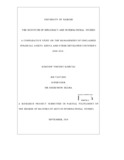| dc.description.abstract | The financial sector plays a critical part in a country's development and it is therefore vital to progressively devise policies that support the sector in executing this role. The banking, insurance, capital markets and the pensions are key sectors within the Kenya's financial system and have each undergone through major reforms in the last decade particularly after the year 2003. A review of the different reform initiatives, indicate that one area within the financial sector that has not been adequately addressed, is on the management of unclaimed financial assets. Kenya does not have a well developed and institutionalized policy framework in place to guide and direct institutions in handing unclaimed assets and this has led to different financial institutions within the sector, devising their own internal policies to manage them.
The overall effect of this is that there are varied operational guidelines within the financial institutions to manage unclaimed assets. This research sought to undertake a comparative analysis on the management of unclaimed assets between Kenya and developed countries like the United Kingdom, Ireland, US and Australia with a view of making recommendations on how Kenya can address its unclaimed assets based on the prevailing best practices worldwide. Both primary and secondary data were used in the study. Due to the nature of the subject, experts operating in public and private sectors in the financial system were interviewed to help provide insights on how best to handle unclaimed assets. Unclaimed financial assets results from untimely death, immigration, loss of contacts, mergers and at times lack of knowledge among the public on how to about in dealing with such assets. Since there are no legal stipulations that require the holders of such assets to disclose them, they have been left to accumulate.
This goes against international best practices and also denies rightful owners and dependents access to such resources that they can use to better their livelihoods while at the same time contributing to the country's progress. The establishment of a legal framework in Kenya will be instrumental in maintaining market confidence; promoting public understanding of the financial system; securing the appropriate degree of protection for consumers; and fighting malpractices. The management framework will also support efforts to enhance corporate governance in the financial sector. Corporate governance is associated with the trend towards greater corporate responsibility and the conduct of business within acceptable ethical standards. Transparency, accountability and openness in reporting and disclosure of information, both operational and financial, are internationally accepted to be vital to the practice of good corporate governance. Proper management of unclaimed assets also presents the government with an opportunity to increase its revenue base. These resources can be used to support the country's development process as this is one of the methods that other countries have employed to widen their non tax-revenue. | en_US |

